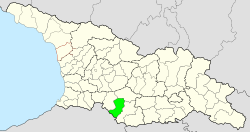Aspindza Municipality
Aspindza Municipality
ასპინძის მუნიციპალიტეტი | |
|---|---|
 | |
 Location of the municipality within Georgia | |
| Country | |
| Mkhare | Samtskhe-Javakheti |
| Capital | Aspindza |
| Government | |
| • Type | Mayor–Council |
| • Mayor | Rostom Magraqvelidze (GD) |
| Area | |
• Total | 825 km2 (319 sq mi) |
| Population (2021)[1] | |
• Total | 10,587 |
| • Density | 13/km2 (33/sq mi) |
| Time zone | UTC+4 (Georgian Time) |
Aspindza (Georgian: ასპინძის მუნიციპალიტეტი, Aspindzis munitsipalit'et'i) is a municipality in southern Georgia, in the region of Samtskhe-Javakheti with a population of 10,372 (2021[1]). Its main town and administrative center is Aspindza and it has an area of 825 km2 (319 sq mi).
Administrative divisions
[edit]Aspindza municipality is administratively divided into one borough (დაბა, daba), the municipal centre Aspindza and 18 communities (თემი, temi) with 55 villages (სოფელი, sopeli):[2]
Politics
[edit]Aspindza Municipal Assembly (Georgian: ასპინძის საკრებულო, Aspindzis Sakrebulo) is a representative body in Aspindza Municipality, consisting of 30 members which are elected every four years. The last election was held in October 2021. Rostom Magraqvelidze of Georgian Dream was elected mayor.
| Party | 2017[3] | 2021[4] | Current Municipal Assembly | ||||||||||||||||||||||||||||||||||||||||
|---|---|---|---|---|---|---|---|---|---|---|---|---|---|---|---|---|---|---|---|---|---|---|---|---|---|---|---|---|---|---|---|---|---|---|---|---|---|---|---|---|---|---|---|
| Georgian Dream | 22 | 19 | |||||||||||||||||||||||||||||||||||||||||
| United National Movement | 1 | 6 | |||||||||||||||||||||||||||||||||||||||||
| People's Power | 3[a] | ||||||||||||||||||||||||||||||||||||||||||
| European Georgia | 2 | 1 | |||||||||||||||||||||||||||||||||||||||||
| Lelo | 1 | ||||||||||||||||||||||||||||||||||||||||||
| Alliance of Patriots | 2 | ||||||||||||||||||||||||||||||||||||||||||
| Total | 27 | 30 | |||||||||||||||||||||||||||||||||||||||||
Population
[edit]
By the start of 2021 the population was determined at 10,587 people,[1] a slight increase compared to the 2014 census.[2] The population of Aspindza town decreased slightly during the same period. The population density of the municipality is 13.2 inhabitants per square kilometre (34/sq mi).
The population consists for 86% of Georgians. By far the largest ethnic minority are the Armenians, who make up more than 13% of the population. Almost all of them live in the village of Damala, just outside the main town of Aspindza. Furthermore, some Russians, Ossetes, Ukrainians and Greeks live in the municipality. The population consists for 74.8% of followers of the Georgian Orthodox Church and 11.6% is Muslim followed by followers of the Armenian Apostolic Church (almost 10%), Catholics (2.3%) and a small community of several dozen Jehovah's Witnesses.
| Population Aspindza Municipality | ||||||||||||||||||
|---|---|---|---|---|---|---|---|---|---|---|---|---|---|---|---|---|---|---|
| 1886 | 1917 | 1923 | 1939 | 1959 | 1970 | 1979 | 1989 | 2002[7] | 2014 | 2021 | ||||||||
| Aspinda Municipality | - | - | - | 32,644 | ||||||||||||||
| Aspindza | - | 553 | ||||||||||||||||
| Data: Population statistics Georgia 1897 to present.[8][9][10] Note:[7] | ||||||||||||||||||
In November 1944, the Meskhetian Turks, a Turkic-speaking ethnic group of predominantly Muslim faith living in this area, were deported to Soviet Central Asian republics as part of a Stalinist resettlement operation.[12] At that time, the Meskhetians constituted two-thirds of the population of the rajon Aspindza (1939: 21,612 of the 32,644 inhabitants).[10] Attempts to return them to independent Georgia have failed, with local resistance.[13][14]
See also
[edit]Explanatory notes
[edit]- ^ Split from Georgian Dream.[5][6]
References
[edit]- ^ a b c "Population and Demography - Population by cities and boroughs (daba), as of 1 January". National Statistics Office of Georgia, Geostat. 2021-01-01. Retrieved 2022-01-03.
- ^ a b "Main Results of the 2014 Census (Publication)" (PDF). Census.ge, National Statistics Office of Georgia (Geostat) (in Georgian). 2016-04-28. p. 290-293. Archived from the original (pdf) on 2020-02-13. Retrieved 2022-01-19.
- ^ "Protocol elected municipal council members and mayors 2017" (PDF) (in Georgian). CESKO Central Election Commission. p. 43-45. Retrieved 2021-01-06.[permanent dead link]
- ^ "Protocol elected municipal council members and mayors 2021" (PDF) (in Georgian). CESKO Central Election Commission. p. 53-55. Retrieved 2021-01-06.[permanent dead link]
- ^ "„ოცნება" დეპუტატებმა კიდევ 3 საკრებულოში დატოვეს". Netgazeti (in Georgian). 2022-07-13. Archived from the original on 2023-03-12. Retrieved 2023-02-17.
- ^ "'ხალხის ძალას' სამცხე-ჯავხეთიდან 'ოცნების' 10–მდე დეპუტატი შეუერთდა". sknews.ge (in Georgian). 2022-10-25. Archived from the original on 2023-02-27. Retrieved 2024-06-15.
- ^ a b The 2014 census found an inexplicable gap with the data from the national statistical office Geostat. UN-assisted research has found the 2002 census was inflated by about 8-9 percent. See,[11] "1. Introduction", Page 1.
- ^ "Population divisions of Georgia". Population Statistics Eastern Europe and former USSR. Retrieved 2022-01-18.
- ^ "Population cities & towns of Georgia". Population Statistics Eastern Europe and former USSR. Retrieved 2022-01-18.
- ^ a b "1939 census". Ethno Kavkaz (in Russian). Retrieved 2022-02-23.
- ^ "Population Dynamics in Georgia - An Overview Based on the 2014 General Population Census Data" (PDF). National Statistics Office of Georgia, Geostat. 2017-11-29. Retrieved 2022-01-01.
- ^ "From Exile to Exile: The Perpetual Deportation of the Ahıska Turks". Genocide Watch. 2021-01-27. Retrieved 2022-02-15.
- ^ "Meskhetian Turks Return to Lost Homeland in Georgia". Eurasianet. 2009-10-09. Retrieved 2022-02-15.
- ^ "Meskhetian Turks: Still Struggling to Return to Their Homeland". Eurasianet. 2003-03-25. Retrieved 2022-02-15.


